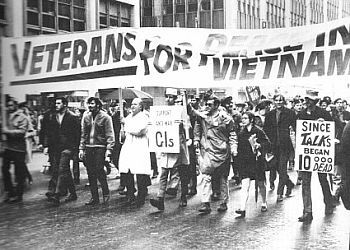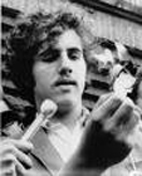THE BEGINNING OF THE OPPOSITION
Many Americans opposed the war on moral grounds, seeing it as a destructive war against Vietnamese independence, or as intervention in a foreign civil war; others opposed it because they felt it lacked clear objectives and appeared to be unwinnable. Many anti-war activists were themselves Vietnam Veterans, as evidenced by the organization Vietnam Veterans Against the War.
 In opposition to the increased American presence in Vietnam, many prominent senators had begun to criticize the administration's decisions. By 1965, this antiwar sentiment became mainstream, as demonstrated by the mass antiwar movement that occurred in the summer of 1965. In its later stages, the antiwar movement greatly influenced US military policy. In opposition to the increased American presence in Vietnam, many prominent senators had begun to criticize the administration's decisions. By 1965, this antiwar sentiment became mainstream, as demonstrated by the mass antiwar movement that occurred in the summer of 1965. In its later stages, the antiwar movement greatly influenced US military policy.
In 1965, the US launched its strategic bombing of Northern Vietnam. Yet, North Vietnamese leader Ho Chi Minh refused to listen to American demands, and the continued bombings and the increasing number of American fatalities in Vietnam soon became fuel for a growing antiwar movement. The public opinion against the bombings intensified.
Even along the front in Vietnam, the antiwar movement was spreading. Combat troops began to wear antiwar symbols, and showed their opposition to the war with peace signs, movement salutes, and even demonstrations.
Draft resistance
The draft initiated protests when on May 5, 1965, student activists at the University of California, Berkeley marched on the Berkely Draft board and forty students staged the first public burning of a draft card in the United States. Another 19 cards were burnt May 22 at a demonstration following the Berkeley teach-in. In late July 1965, Johnson doubled the number of young men to be drafted per month from 17,000 to 35,000, and on August 31, signed a law making it a crime to burn a draft card.
 In order to gain an exemption or deferment many men obtained student deferments by attending college, though they would have to remain in college until their 26th birthday to be certain of avoiding the draft. Some got married, which remained an exemption throughout the war. Some men found sympathetic doctors who would claim a medical basis for applying for a 4F (medically unfit) exemption, though Army doctors could and did make their own judgments. Still others joined the National Guard or entered the Peace Corps as a way of avoiding Vietnam. All of these issues raised concerns about the fairness of who got selected for involuntary service, since it was often the poor or those without connections who were drafted. In order to gain an exemption or deferment many men obtained student deferments by attending college, though they would have to remain in college until their 26th birthday to be certain of avoiding the draft. Some got married, which remained an exemption throughout the war. Some men found sympathetic doctors who would claim a medical basis for applying for a 4F (medically unfit) exemption, though Army doctors could and did make their own judgments. Still others joined the National Guard or entered the Peace Corps as a way of avoiding Vietnam. All of these issues raised concerns about the fairness of who got selected for involuntary service, since it was often the poor or those without connections who were drafted.
|

